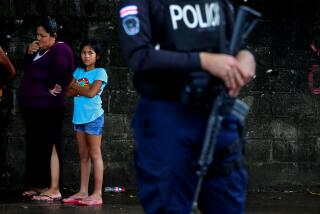Nicaragua: Greater Menace Than Cuba? : Ex-U.N. Envoy Believes So Because of Its Strategic Location
- Share via
Former U.N. Ambassador Jeane Kirkpatrick said that a recent visit to Central America has further convinced her that the Marxist-Leninist government in Nicaragua poses even more of a danger to U.S. interests than Cuba--a danger that one day may involve the basing of nuclear weapons in Nicaragua.
Kirkpatrick, who left her United Nations post earlier this year to resume her teaching career, told a Los Angeles fund-raiser for Whittier College on Friday night that the United States should promote an alliance with its friends in Central America--such as Costa Rica and the present government of El Salvador--modeled on the North Atlantic Treaty Organization.
“I believe that in considering our problems in Central America today we should think back to our success in solving problems in Western Europe after World War II,” Kirkpatrick said.
“And we should consider an alliance, perhaps modeled on NATO, among nations, each of them committed themselves to democratic values and institutions, each of them committed to independence . . . and each of them committed to guarding their areas and their hemisphere from intrusion by alien dictatorships. I do not believe we can turn our backs on this problem, because, unlike Vietnam, Central America is (closer to) us. Geography is destiny. We are stuck with these problems.”
Then, noting that the Nixon Administration once negotiated a treaty that was supposed to preclude nuclear submarine facilities in Cuba, Kirkpatrick said: “There are more nuclear submarine facilities at Cienfuegos (Cuba) today than anyone dreamed of, and a large capacity for offensive arms. That’s just an example of what we might expect in Nicaragua.”
At a press conference Friday before the fund-raiser, Kirkpatrick said:
“The number of parallels between Nicaraguan development and Cuban development is very large. But Nicaragua won’t be another Cuba--it’ll be more serious. Cuba is an island, which means it is somewhat insulated. Nicaragua is not an island. It is in the center of Central America and therefore has the capacity for radiating north and south in a way that Cuba does not.
“Central America is a homogeneous area, culturally and linguistically. The capacity for contagion and destabilization is larger than among the Caribbean Islands because they are separated by the Caribbean.”
Kirkpatrick also said at the press conference that she felt Congress would ultimately approve financial assistance to the Contras , the anti-Sandinista troops fighting the Nicaraguan government.
“Should the Congress fail to provide assistance to the democratic forces, then I think we shall see a consolidation of power by that Communist dictatorship and a progressive use of Nicaragua as a base for the projection of Soviet military power.
“The members of Congress who vote ‘no’ to assistance to the Contras will regret it,” Kirkpatrick predicted.
More to Read
Sign up for Essential California
The most important California stories and recommendations in your inbox every morning.
You may occasionally receive promotional content from the Los Angeles Times.













